Key takeaways:
- Crisis scenarios expose vulnerabilities and stress the importance of emotional preparedness and communication in managing real-life emergencies.
- Effective crisis management relies on proactive planning, community collaboration, and ongoing training to build resilience and adaptability among responders.
- Learning from past crises emphasizes the need for clear communication, scenario planning, and community engagement to enhance future crisis responses.
- Post-crisis debriefs and relationship-building with stakeholders are essential for continuous improvement and effective future planning in crisis management.
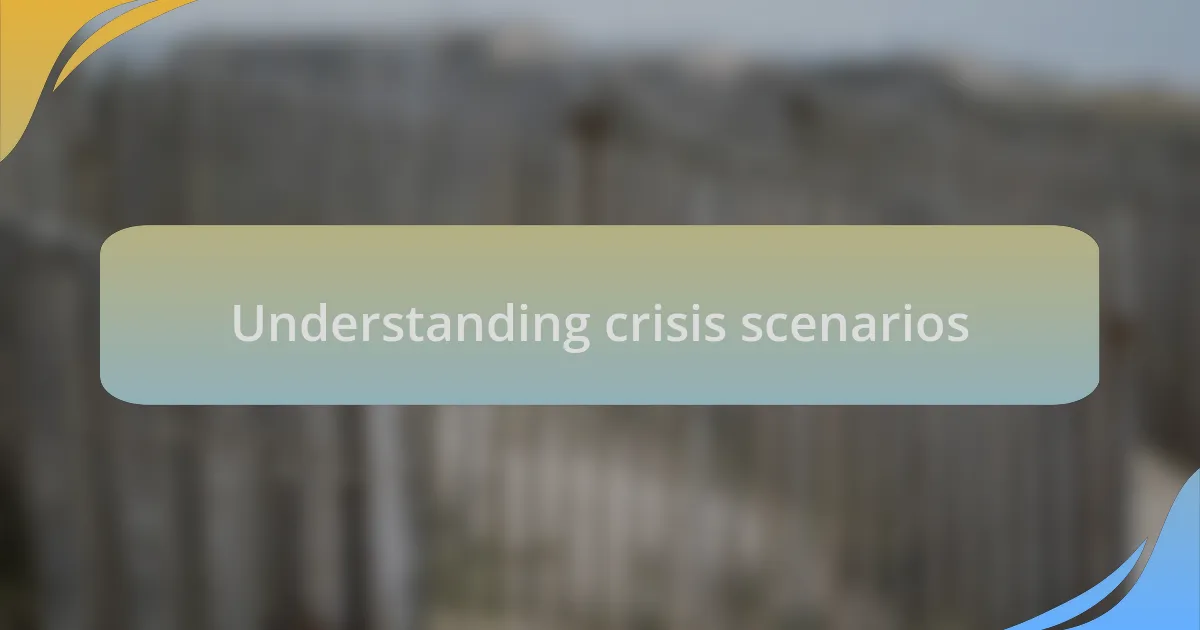
Understanding crisis scenarios
Crisis scenarios often emerge when the unexpected disrupts our sense of safety, forcing us to confront vulnerabilities we might otherwise overlook. I recall a drill that simulated a natural disaster, and the stress and uncertainty it created among us were palpable. Isn’t it fascinating how these experiences not only test our preparedness but also reveal our strengths and weaknesses?
In understanding crisis scenarios, it’s essential to recognize the emotional toll they take on individuals and communities. I remember talking with a colleague after a tabletop exercise, and we both agreed that the fear and anxiety felt during the simulations mirrored what many people experience during real crises. How do we transform that raw emotion into actionable strategies?
As we delve deeper, realizing that crisis scenarios aren’t just theoretical exercises becomes crucial. These are real-life reflections of potential disasters that can threaten our homeland security. After a significant incident in my area, I saw firsthand how vital communication and resource allocation were in managing not just the immediate aftermath, but also the long-term recovery process. It made me wonder: how prepared are we to handle such situations when they inevitably arise?
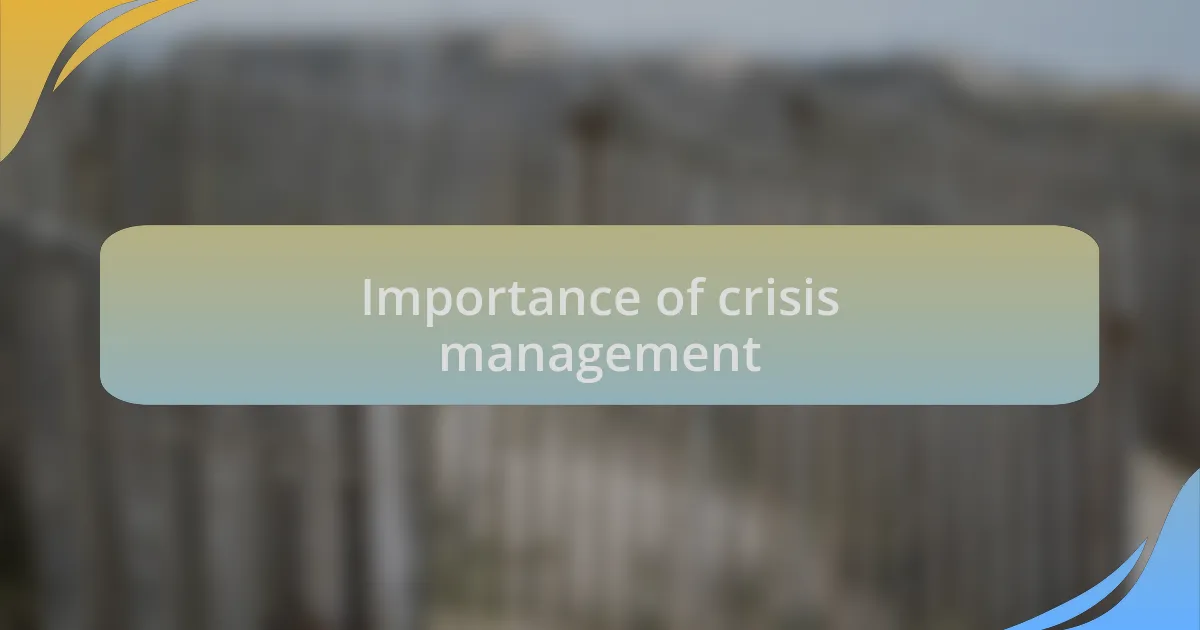
Importance of crisis management
Crisis management is crucial because it lays the groundwork for effective response strategies during emergencies. I vividly remember a training session where we discussed the aftermath of a major flood; the chaotic state highlighted the importance of a well-coordinated plan. It’s eye-opening to consider how a single misstep can escalate a crisis, making us question: how equipped are we to avoid such pitfalls?
Moreover, being proactive in crisis management fosters resilience within communities. I often think about the sense of camaraderie I felt during a community workshop after a wildfire threatened our town. The conversations weren’t just about survival, but also about rebuilding trust and support among neighbors. This communal bond is vital; it begs the question: aren’t we stronger together in the face of adversity?
Finally, the importance of ongoing training and simulations cannot be overstated. I recall an unsettling but enlightening drill that tested our decision-making under pressure, leaving me with a lasting understanding of our limits and capabilities. This experience underscored a pivotal point: are we truly ready for the unpredictable, or do we need to strengthen our skills further? The answers we find can make all the difference in a real crisis.
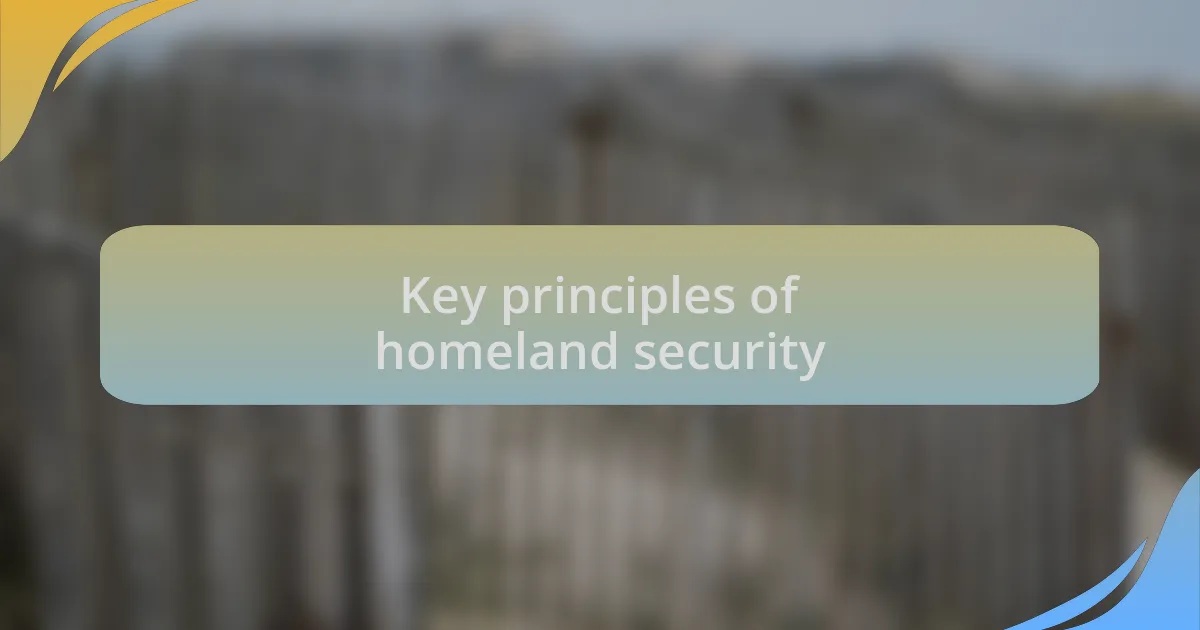
Key principles of homeland security
One of the key principles of homeland security is the necessity of a comprehensive understanding of threats. I recall attending a conference where experts analyzed various potential threats, and it struck me how diverse these risks can be—ranging from cyber attacks to natural disasters. This diversity teaches us that, in order to protect our communities, we must continuously educate ourselves about both evolving threats and the vulnerabilities they exploit. How often do we assess our own readiness against these possible scenarios?
Collaboration is another fundamental principle that can’t be overlooked. During an emergency response exercise in my local area, I felt the power of partnership firsthand. Firefighters, police, and medical personnel working side by side illuminated the importance of breaking down silos. It’s amazing how fortified relationships can lead to more effective action, but it raises an important thought: are we truly leveraging all available resources to enhance unity and efficiency in times of crisis?
Finally, the principle of adaptability stands out as essential in homeland security. I remember how my team had to shift our strategies abruptly during an unexpected storm, demonstrating the importance of flexibility. When faced with the unknown, being able to re-evaluate and pivot can be a game-changer. This learning invites us to reflect: how well-equipped are we to change our approaches when situational dynamics shift unexpectedly?
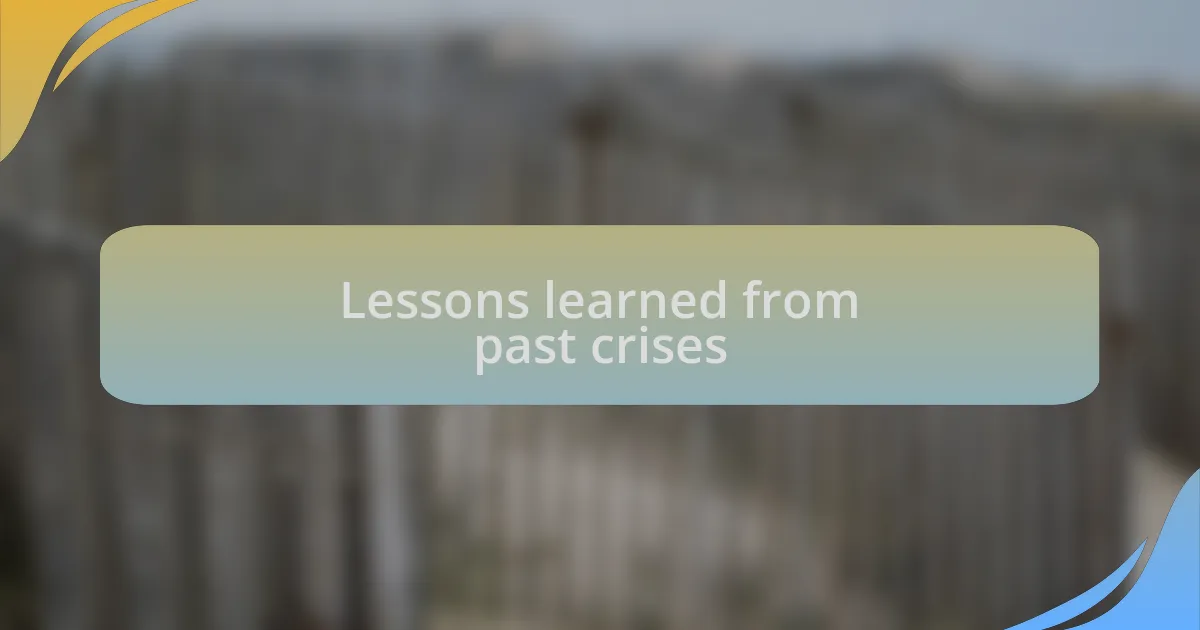
Lessons learned from past crises
The analysis of past crises reveals that communication is often the linchpin for effective response and recovery. I recall a local emergency where miscommunication led to delays in deploying resources. That experience cemented my belief that clear, concise communication channels save lives. Have we prioritized these channels in our current emergency plans?
Another important lesson I’ve learned is the value of scenario planning. During a workshop, I engaged in a simulated crisis that required us to navigate through the chaos of misinformation. The insights gained from those exercises illuminated how planning for varied scenarios offers a roadmap for real-world applications. I can’t help but wonder: how prepared are we to face the unexpected, and are our contingency plans robust enough to withstand the pressures of real crises?
Lastly, I’ve realized that community engagement plays a vital role in resilience. A few years back, I participated in a neighborhood preparedness event, and the sense of empowerment felt among residents was palpable. Collective readiness fosters a shared responsibility that can significantly bolster response efforts. How often do we tap into the strengths of our communities to build the resilience needed for any crisis we might face?
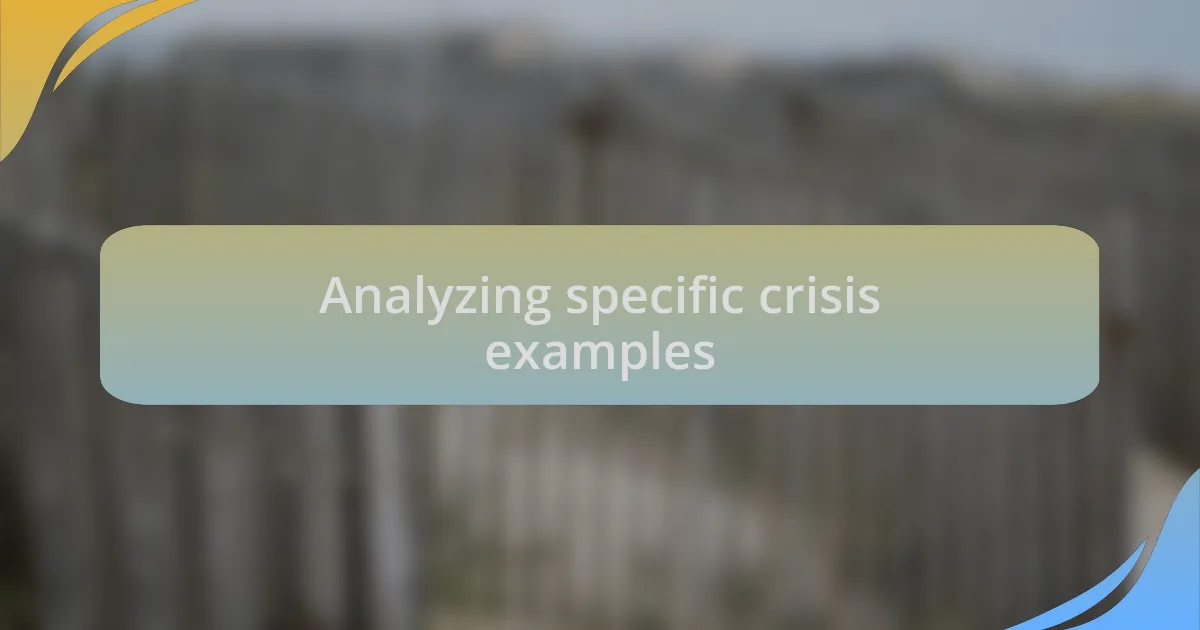
Analyzing specific crisis examples
When analyzing specific crisis examples, it’s striking to observe how the timing of response can alter outcomes dramatically. I still vividly remember the aftermath of a flood in a neighboring town—the first responders arrived swiftly, but their efforts were hampered by a lack of coordination with local volunteers and community organizations. This chaotic situation made me realize how critical it is to establish pre-existing relationships between governmental agencies and community groups to ensure a seamless response during actual emergencies. Are we building these vital connections before disaster strikes?
Another eye-opening crisis was a cybersecurity breach that affected a major city’s infrastructure. I participated in a post-crisis review meeting, and I witnessed the palpable frustration among decision-makers who realized they were unprepared for such an attack. This experience taught me the importance of not just prevention but also mitigation strategies. How often do we invest in training our IT staff to handle breaches when they occur, rather than solely focusing on securing systems in the first place?
One particular scenario that stands out involved a public health emergency where rumors spread like wildfire, creating confusion and panic. During that time, I found myself volunteering at a local health agency, helping to disseminate accurate information. I learned firsthand how effective messaging can ground a community during uncertainty. It’s concerning to think—we often focus on the technology of communication, but how well do we truly understand the human element behind these messages?
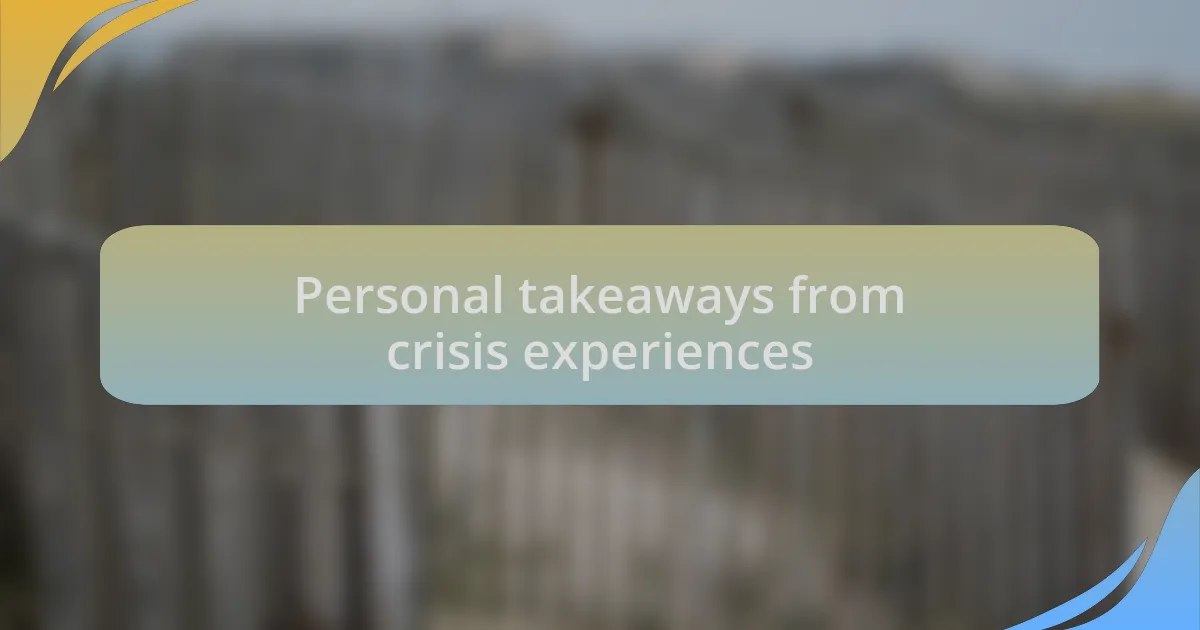
Personal takeaways from crisis experiences
In reflecting on my experiences during a crisis, I’ve come to understand the profound impact of adaptability. I recall a fire outbreak at a local business where my team had to quickly pivot our initial response plan. The moments of uncertainty tested our resolve, but it was the flexibility we embraced that turned the tide for everyone involved. How often do we practice adapting on the fly, rather than sticking rigidly to a predetermined plan?
Another takeaway that resonates with me is the sheer necessity of emotional intelligence in crisis management. I was part of a team responding to a natural disaster where fear ran rampant among the affected individuals. I learned that sometimes, more than resources or strategies, people need empathy and reassurance. Are we equipping ourselves to connect with those most vulnerable, or do we overlook the emotional aspects during our focus on logistical challenges?
Lastly, I’ve realized that the lessons from a crisis often linger long after the immediate danger has passed. After responding to a significant public event security breach, I found myself reflecting on how the experience changed our approach to future events. It taught me that every crisis is a learning opportunity, not just for developing protocols, but for fostering a culture of continuous improvement. Are we truly committed to evolving and using past experiences to enhance our preparedness for what’s next?
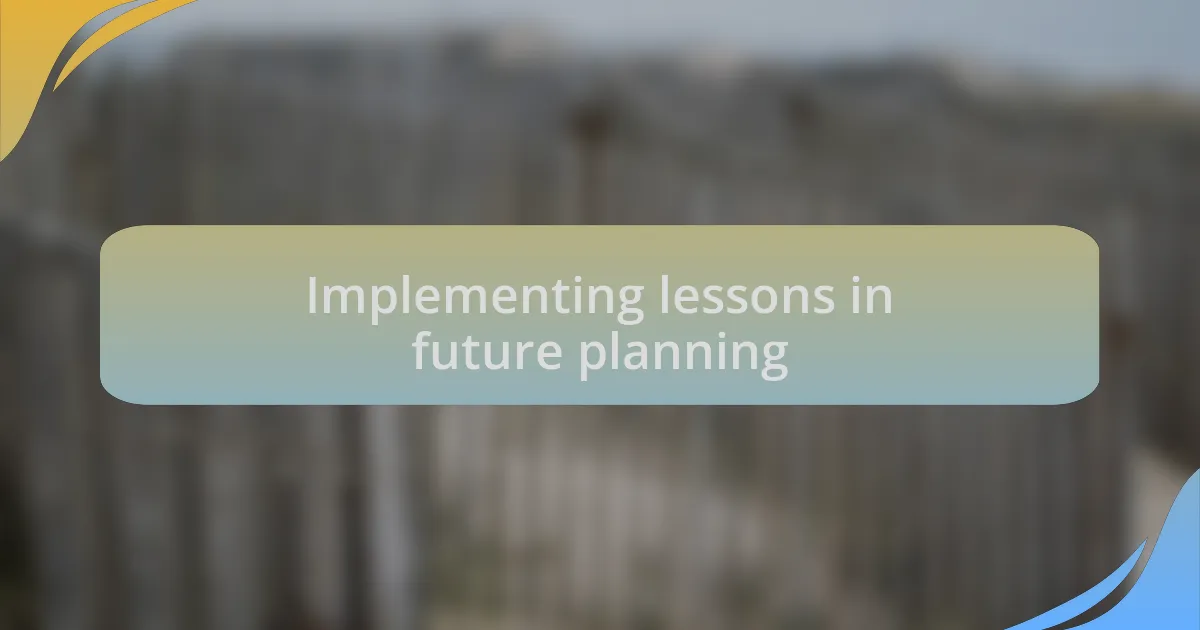
Implementing lessons in future planning
One of the key aspects I’ve learned when planning for the future is to incorporate debriefs after every crisis response. In my experience, I participated in a post-event analysis following a security incident at a crowded public gathering. We sat around a table, sharing not just what went well but also where we faltered. This open dialogue was crucial; it highlighted blind spots in our strategy and revealed pieces we had overlooked. How often do we take the time to truly analyze our actions and learn from them?
Moreover, I’ve found that building relationships with community stakeholders is vital to effective future planning. During a health emergency in my town, we collaborated with local organizations and emergency services. This partnership ultimately led to more streamlined communications and a greater sense of collective responsibility. Aren’t we sometimes too focused on our own organizations to recognize the power of collaboration? Engaging with others not only strengthens our plans but also fosters a united front in addressing crises.
Finally, I believe that simulation exercises are indispensable in translating lessons into actionable plans. When my team engaged in a series of mock drills, we discovered gaps in our communication channels that we hadn’t anticipated. The pressure of the simulated crisis forced us to think critically and adapt in real-time. So, how can we ensure that our future planning always includes testing our limits through such drills? This practice helps me feel more prepared and confident when real situations arise.